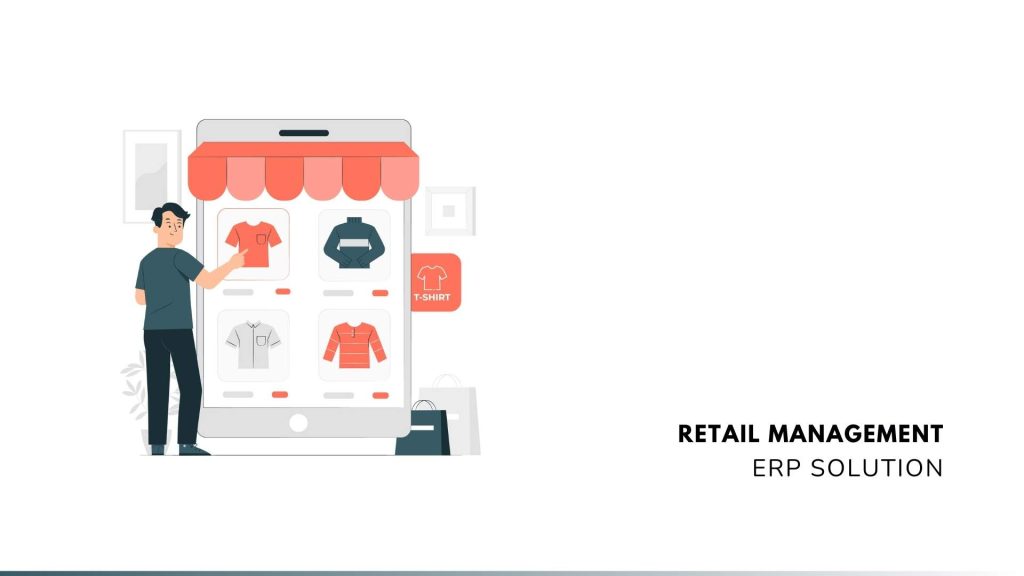In today’s retail world, adapting swiftly to market changes and providing seamless customer experiences is critical for success. Amid the dynamic landscape of retailing, cloud-based ERP software has emerged as a linchpin for retailers. This software has revolutionized how retailers manage operations, optimize processes, and stay ahead in a fiercely competitive market. From redefining inventory management to harnessing the power of real-time analytics, Cloud ERPs have become indispensable tools, empowering retail businesses to navigate complexities and drive efficiency across every facet of their operations.
Role of ERP in Retail Landscape
Retail ERP systems are pivotal in integrating various business processes, providing a centralized management platform. Discuss how ERPs streamline inventory, sales tracking, customer relationship management (CRM), supply chain, and financials, fostering operational efficiency and agility.
ERP Benefits for Retail Management
Efficient Inventory Management:
In retail, maintaining optimal inventory levels is critical. ERP systems offer real-time visibility into inventory across multiple locations and channels. This visibility helps in:
- Preventing Stock outs: ERP systems predict demand by analyzing sales data and trends, ensuring that popular products are always available.
- Reducing Excess Stock: Inventory optimization tools within ERPs prevent overstock situations, minimizing tied-up capital and reducing the risk of obsolete stock.
Enhanced Customer Experience:
Retail ERPs integrate customer relationship management (CRM) functionalities, enabling businesses to understand customer preferences and behaviors. It allows for:
- Personalized Interactions: By storing customer data, purchase history, and preferences, ERPs facilitate customized marketing campaigns and tailored recommendations, enhancing customer engagement.
- Unified Customer Service: A centralized system ensures that customer inquiries, orders, and interactions across various touchpoints are seamlessly managed, improving service.
Streamlined Operations and Workflow Automation:
ERP systems automate routine tasks and streamline workflows, optimizing operational efficiency by:
- Reducing Manual Errors: Automating repetitive tasks like data entry minimizes errors and frees employees to focus on strategic activities.
- Integrated Processes: From procurement to sales, finance, and supply chain management, ERPs integrate these processes, allowing for smoother operations and better collaboration among departments.
Data-Driven Decision Making:
Access to real-time data and analytics is one of the most powerful benefits of retail ERPs, enabling:
- Insightful Analytics: ERPs generate reports and analytics on sales, inventory turnover, customer behavior, and more, providing actionable insights for better decision-making.
- Forecasting and Planning: Through historical data analysis and predictive analytics, retail ERPs aid in demand forecasting, inventory planning, and strategic decision-making.
Key Features of ERP for Retail Business
Integrated Inventory Management:
A robust ERP for retail includes comprehensive inventory management functionalities:
- Real-Time Tracking: Allows continuous monitoring of stock levels across multiple locations, providing accurate insights into inventory.
- Demand Forecasting: Uses historical data and analytics to predict demand, preventing stock outs or overstock situations.
- Automated Reordering: Sets reorder points and triggers automated purchase orders when inventory levels reach predefined thresholds.
Unified CRM and Sales Integration:
An effective retail ERP integrates CRM capabilities to manage customer relationships and sales processes:
- Customer Data Centralization: Stores and manages customer data, purchase history, preferences, and interactions across various touchpoints.
- Sales Tracking and Analysis: Tracks sales performance, identifies trends and facilitates targeted marketing and sales strategies based on customer behavior.
Financial Management and Reporting:
A comprehensive ERP for retail includes robust financial management tools:
- Accounting and Invoicing: Streamlines financial processes, including accounts payable/receivable, invoicing, and general ledger management.
- Financial Reporting: Generates detailed financial reports, providing insights into profitability, cash flow, and performance metrics.
Omnichannel Capabilities:
Modern retail ERPs focus on providing omnichannel capabilities to cater to diverse customer preferences and sales channels:
- Integration Across Channels: Seamlessly integrates online, in-store, mobile, and other sales channels to offer a unified customer experience.
- Order Fulfillment: Manages orders from various channels, enabling efficient fulfillment and delivery processes.
Trends in Retail Business
- Omnichannel Retail: Seamless integration across online and offline channels for a unified customer experience.
- AI and Predictive Analytics: Utilizing AI for personalized recommendations and predictive inventory management.
- Mobile Commerce: The increasing shift towards mobile-first shopping experiences.
- Sustainability and Ethical Practices: Consumer demand for eco-friendly products and socially responsible practices.
Retail ERPs vs. Traditional ERPs
- Customization for Retail Needs: Retail ERPs are tailored with features specific to the industry, such as POS integration and merchandising.
- Scalability and Flexibility: Cloud-based retail ERPs offer easier scalability and flexibility than traditional on-premises systems.
- Real-time Data and Analytics: Retail ERPs focus on providing real-time insights crucial for quick decision-making in the fast-paced retail environment.
How can Acumatica enhance retail business?
Important Functionality for Retail Companies: Acumatica Retail Edition offers a wide range of industry-specific capabilities, including:
- Commerce Connectors
- CRM
- Inventory Management
- Customer Self-Service Portal
- Sales Order Management
- Financial Management
- Reporting, Dashboards, and Data Analysis Toolkit
- ERP Business Intelligence and Analytics in Acumatica
- Warehouse Management System
The deployment of Acumatica Retail Management Software is a transformative solution poised to elevate businesses to new heights. With its comprehensive suite of features, including robust inventory management, seamless integration across channels, sophisticated CRM functionalities, and real-time analytics, Acumatica empowers retailers to streamline operations, optimize inventory, and deliver unparalleled customer experiences.
Its scalability, flexibility, and cloud-based architecture not only future-proof businesses but also enable agile decision-making and foster sustained growth. Acumatica Retail Management Software catalyzes retailers, allowing them to adapt, innovate, and thrive in a competitive market while nurturing lasting customer relationships and driving profitability.”

Vijay comes with a vast experience in ERP and enterprise solutions space with about 20 years of experience in various packaged application like Acumatica, SAP, Orion, Salesforce.com, SugarCRM and, SalesLogix.

